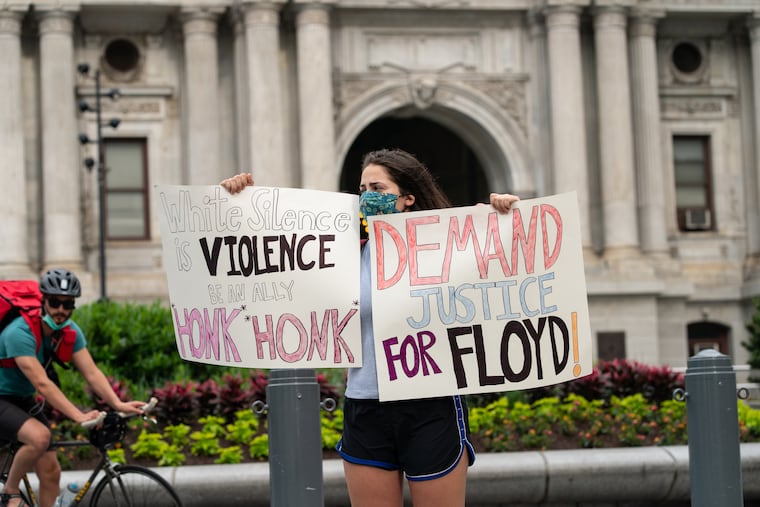Mayor Jim Kenney vows Philly police will be respectful of protesters at George Floyd demonstration
The Philadelphia demonstration is planned for noon Saturday at City Hall. Kenney said the city’s experience handling large demonstrations has prepared it for the protest.

» LIVE UPDATES: Follow along here for the latest updates and images from Saturday’s protests
A day before a planned demonstration outside City Hall over the death of George Floyd in Minneapolis, Mayor Jim Kenney on Friday vowed that police will treat the protesters with respect, and said he was hopeful the city will avoid the destruction seen in some demonstrations elsewhere.
“In the midst of a global pandemic, America’s original sin of racism has not gone dormant,” Kenney said at a virtual news conference. “Black Americans are outraged, and they should be. I’m outraged, too. As a white man, I will never know the heartbreak and trauma that the black community continues to experience. But I want black Philadelphians to know that I and other city leaders stand with them and are here to support them during this painful time.”
Floyd, an African American man, died in handcuffs after saying, “I can’t breathe,” while a white police officer, Derek Chauvin, knelt on his neck. A video went viral on social media, igniting protests across the country. In Minneapolis, demonstrators burned a police precinct house. Chauvin on Friday was charged with third-degree murder.
» READ MORE: Minneapolis police officer who knelt on Floyd’s neck charged with murder
The Philadelphia demonstration is planned for noon Saturday. Kenney said the city’s experience handling large demonstrations has prepared it for the protest.
“We’re used to people protesting various issues. It’s their right to protest. Our only rules are: You can protest as loud and as long as you want, but to destruct property or hurting someone else will not be permitted,” he said. “We’re very well schooled, from the [2000] Republican National Convention onward, on how to handle these events. We’ll be respectful, and we expect people to be respectful and to express their anger, express their concern.”
Kenney also acknowledged the shooting of Robert Friel, a police lieutenant who was shot while off-duty Friday morning in South Philadelphia. Friel, a 28-year veteran, suffered a broken femur after being shot in a leg and was reported in stable condition at Thomas Jefferson University Hospital.
“His injury comes as we continue to see acts of gun violence rising in our city. As we said before, the plague of gun violence is a public health crisis in Philadelphia, and it’s not going away while we battle the pressing public health threat from COVID-19,” Kenney said. “I want to thank all of our law enforcement officers for their continued service during this crisis and every day they put their lives on the line when they put on their uniforms.”
» READ MORE: S. Philly lieutenant shot by a reputed motorcycle gang member
New Jersey Gov. Phil Murphy also addressed Floyd’s death Friday at a briefing on the coronavirus pandemic.
“There is no doubt that the centuries-old stain of systemic racism is far from being erased from the fabric of this country. We also know that the overwhelming majority of our law enforcement officers believe strongly in the communities they have sworn to protect,” Murphy said. “But what we are seeing right now in Minneapolis is painful, almost too painful, in fact, to watch. And perhaps that is because that is not the first time we’ve seen such horrific pictures on our screens.”
Murphy also noted that racial minorities in New Jersey, as is the case across the country, have been disproportionately impacted by the coronavirus, which has exacerbated existing inequities in issues like access to quality health care, housing stability, and white-collar employment opportunities in which social distancing is more feasible.
“We have to acknowledge that we can see this through a number of different lenses, but the conclusion is the same,” Murphy said. “This is the first year in the fifth century since slavery first came to our shores. We’re still digging out.”